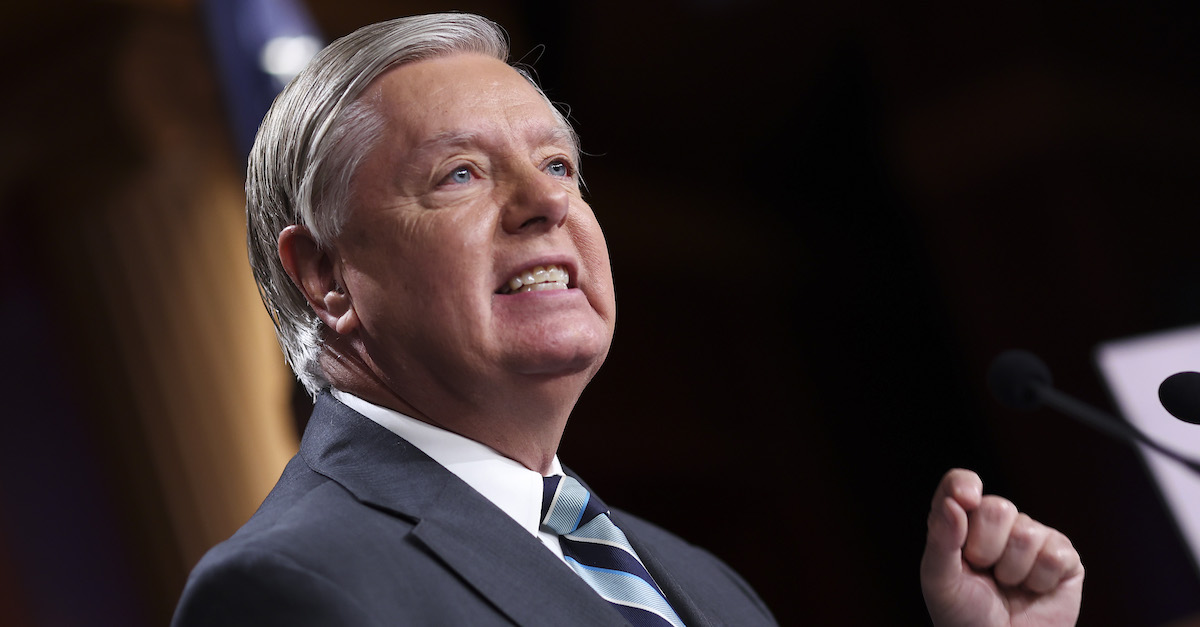
U.S. Sen. Lindsey Graham (R-SC) speaks at a press conference at the U.S. Capitol on August 05, 2022 in Washington, DC.
South Carolina Sen. Lindsey Graham (R), facing a subpoena from Georgia state investigators about his alleged role in Donald Trump’s efforts to overturn the results of the 2020 presidential election, says that the Constitution protects him from questions about interactions he had with election officials from the Peach State.
“For the reasons explained earlier and below, this Court should quash the subpoena compelling this unconstitutional questioning: It is barred by, among other things, the Constitution’s Speech or Debate Clause,” the memo said.
Pursuant to a subpoena from the office of Fulton County District Attorney Fani Willis (D), who has convened a special purpose grand jury to investigate alleged interference with the election, Graham will have to sit for a deposition. Graham is alleged to have had at least two phone calls with Georgia Secretary of State Brad Raffensperger (R) in late 2020, around the same time Trump had also called the state’s top election official and asked him to “find” enough votes to reverse Joe Biden’s victory there.
Graham had initially argued that both sovereign immunity and the Speech or Debate Clause protected him from having to testify, but a district court rejected those claims.
U.S. District Judge Leigh Martin May specifically noted that the Speech or Debate Clause does not protect political actions by legislators.
“[T]he Supreme Court has recognized that there are any number of activities a member of Congress might engage in that unquestionably fall outside the scope of protected legislative activity because they are, in fact, ‘political in nature rather than legislative,'” wrote May, a Barack Obama appointee.
Three appellate judges in the Northern District of Georgia — Charles Wilson, a Bill Clinton appointee, and Kevin Newsom and Britt Grant, both Trump appointees — weren’t so sure, and ordered May to consider arguments from Graham on in support of his position that the Speech or Debate Clause issue shields his activity from questioning.
Graham, through a team of lawyers that includes former Trump White House counsel Don McGahn, argued that any action he undertook regarding Georgia following the 2020 election is protected because it serves a legislative purpose, which falls squarely under the protections of the Constitution’s Speech or Debate Clause.
“Simply put, the Fulton County District Attorney wishes to question Senator Graham about the investigation that informed his vote per the Electoral Count Act, his duties as Committee Chair, and the subsequent introduction of legislation,” Graham argues. “This is exactly what the Speech or Debate clause is supposed to prevent.”
The legal memorandum says that any contact Graham may have had with election officials is “quintessentially protected legislative activity” under the Constitution.
“A Senator’s investigation into a State’s absentee-ballot process and alleged voting irregularities in the State — about topics on which legislation could be had (and in fact was had), and with a vote on certifying the election under the Electoral Count Act certainly impending — is quintessentially protected legislative activity, regardless of how often the Fulton County District Attorney wishes to ignore the certification vote, introduction of legislation, and the like,” Graham’s memo says.
Graham argues that his “investigation” into the Georgia vote had a legislative purpose, noting that he “co-sponsored legislation to amend the Electoral Count Act to correct flaws he discovered during his investigation,” reviewed “election related issues” as Judiciary Committee chair, and investigated “possible ‘national standards’ for mail-in voting.”
“In light of all this, there is no basis for deeming these calls ‘personal’; rather, the facts show they are legislative activity immunized on a straightforward application of the Speech or Debate Clause’s settled rules,” the memo added (citations omitted).
The memo takes somewhat of a personal dig at Willis while characterizing her investigation as nothing less than a threat to politicians everywhere.
“The District Attorney fails to grasp what her contrary position would mean—and not just for Republicans or for Democrats, but for everyone,” the motion says (citations omitted). “It would mean that if one state official offers suggestions or ‘speculation as to motives’ about an act that, viewed objectively, falls within the scope of protected ‘legislative activity,’ a sitting Senator must be made to submit to questioning in order to prove he should not have to submit to questioning. The longstanding and venerable Speech or Debate immunity cannot be lost on such flimsy inferences and suggestions. No: The People who ratified the Constitution ensured that Senators would not ‘be subjected to the cost and inconvenience and distractions of [questioning] upon a conclusion of the pleader’ or someone’s ‘speculation as to motives.'”
While maintaining his position that the entire subpoena should be quashed, Graham argues that if Willis is allowed to proceed, certain lines of questioning should be cut off completely. Specifically, Graham wants the 11th Circuit to block “questions related to the 2020 election” as well as parts of the subpoena “unrelated to the 2020 election.”
Representatives from Willis’ office did not immediately respond to Law&Crime’s request for comment.
Read Graham’s memo, below.
[Photo by Kevin Dietsch/Getty Images.]